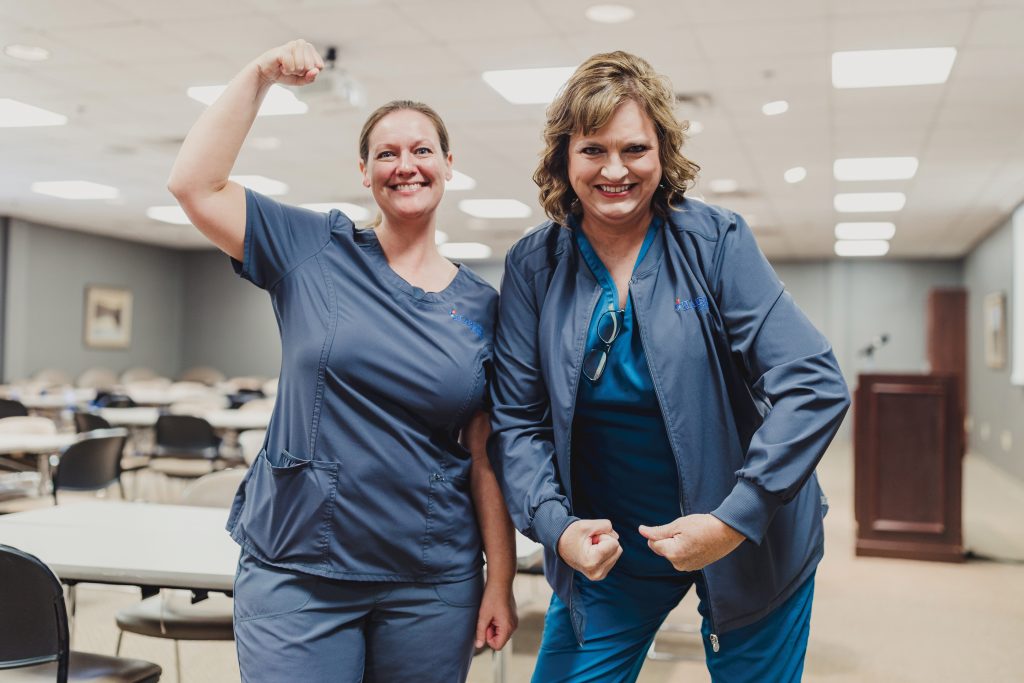
Photos Cameron Flaisch
In an effort to prevent flu and pneumonia, Harbin Clinic has joined a nationwide effort to educate the public on the benefits of vaccination. As the chief medical officer and chief medical information officer at Harbin Clinic, Dr. Ed McBride seeks to raise awareness on ways the public and the medical community can work together to improve the health and wellbeing of the people of Northwest Georgia.
Drafting a battle plan
Each year the medical professionals at Harbin Clinic gather information from the Centers for Disease Control and Prevention, as well as such international sources as the World Health Organization, and craft a strategy for combatting the latest strain of influenza. Since the flu arrives in the Southern Hemisphere first, they determine the effectiveness of vaccines there, and then decide on a response to it here. Dr. McBride explains that these national and international health institutions monitor health issues around the world to make sure everyone is on the same page when it comes to battling preventable illnesses and improving health everywhere.
Dr. McBride says, “The composition of the vaccine this year seems to be a pretty good fit based on what we’re seeing in the Northern Hemisphere and, historically, saw in the Southern Hemisphere.” He goes on to say, “In the Southern Hemisphere, the data suggest that despite an earlier than normal flu season, the vaccine was very successful; it reduced hospitalization for high-risk individuals by forty-nine percent. That’s a pretty successful campaign.”
Following in the wake of that success, Harbin Clinic’s campaign—Antibody Builders—seeks to reach and educate those who are most vulnerable. Dr. McBride says, “The goal is to get the vaccines to those folks so we can either prevent them from getting sick or, if they do become ill, they won’t get as sick and do not require hospitalization.” He explains that recently there has been a significant rise in cases in the local community. “We hope that’s not a bad omen for what’s to come, but we still know that if we invest in our community and educate folks and empower them with knowledge to do something about it, we can get those high-risk individuals vaccinated and prevent unnecessary hospitalizations or ER visits.”
According to Dr. McBride, those at greatest risk are those with diabetes, heart disease or chronic respiratory illnesses, such as asthma or obstructive pulmonary disease. He points out, “Those types of things place people at risk for further complications. They tax their bodies when challenged by an infection. Those people would benefit from early vaccination.”
Disarming objections with facts
Some people object to getting the flu shot because of possible side effects. Dr. McBride urges people to consider the comparison between the mild side effects of the vaccine and the serious ramifications of contracting the flu. “The vaccination may give you a sore arm for a day or make you feel puny for a day,” he says, “but then you’ll be up and running again. That’s a whole different story from getting seriously ill and having dangerous complications—or even, heaven forbid, succumbing to influenza.”
The list of people who should not take the flu shot, according to Dr. McBride, is a short one. As he puts it: “Someone who has a severe allergic reaction that is attributable to that particular vaccine should, of course, not take it.” He also says that if a patient is taking some sort of immuno-compromising medication that would hinder their immunity, they should consult their physician before taking any type of vaccination.
Dr. McBride does, however, encourage people to not overreact to the typically mild side effects of vaccination. He says, “If you’re weighing the pros and cons of getting the vaccine, please know that it allows your body to mount a response. When someone’s arm hurts or they get a low-grade fever after getting the shot, that’s not the same thing as getting the flu—that’s just their immune system cranking up.”
Also, Dr. McBride cautions people to beware of medical misinformation, especially what they might come across on unreliable internet sites. He says, “Sometimes Dr. Google is our friend, and sometimes Dr. Google is not our friend.” Dr. McBride suggests that if a patient has concerns about the vaccine, a good place to start is a respectful conversation with a trusted physician.

Breathing easier
At Dr. McBride’s suggestion, the Antibody Builders campaign promotes the pneumonia vaccine as well. “There’s a whole group of people out there who are at risk of the flu and pneumococcal pneumonia. Pneumococcal pneumonia is a bacterial pneumonia, but it is a vaccine preventable illness now. Historically, it’s been the number one cause of pneumonia in adults, from a bacterial perspective.” Dr. McBride recommends that when patients go to get their flu shot, they should consult with their doctor about whether or not they should also get the pneumonia vaccine.
Besides vaccines, Harbin Clinic always recommends that people get adequate rest, eat a healthy diet, and exercise regularly to promote overall health and personal wellbeing. These things also help the body to mount a defense against opportunistic infections. Dr. McBride stresses the “tried-and-true things like washing your hands, covering your coughs, and staying at home when you’re sick.” He adds, “Empowering folks to be active participants in their own healthcare is something we like to focus on at Harbin Clinic.”












